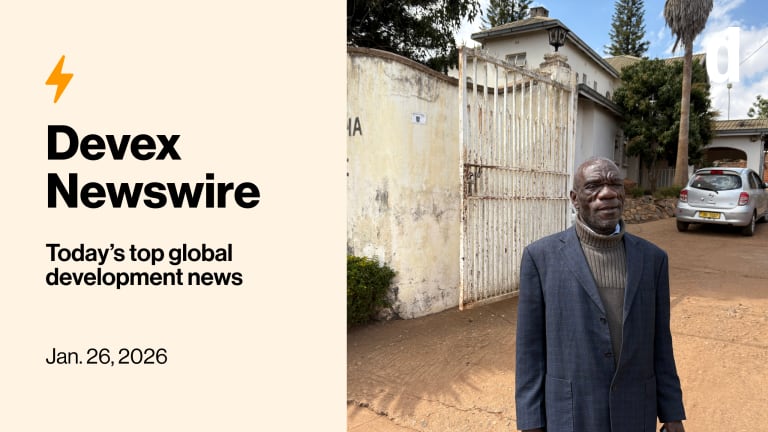
The U.S. election is tomorrow (cue: ominous music in the background). But in all seriousness, the result could be a sea change for women’s health — specifically as it relates to abortions — that could reverberate around the world. We have two reports on what may lie ahead.
Also in today’s edition: Talks at the biodiversity COP stretched into overtime, but apparently that still wasn’t enough time to get the financial spigot open.
A sense of Huber
Valerie Huber is worried about women’s health, the sanctity of the family, and the imposition of a Western ideology that disrespects and disregards the cultural values of other countries.
This is a preview of Newswire
Sign up to this newsletter for an inside look at the biggest stories in global development, in your inbox daily.
Her critics worry that if she gets her way, she would jeopardize women’s lives and impose a Western culture war call to arms that disrespects and disregards the national sovereignty of other countries.
Whichever version you subscribe to, Huber will likely be a force to reckon with in a potential second Trump presidency.
She is the proud author of the “Geneva Consensus Declaration on Promoting Women’s Health and Strengthening the Family,” or GCD, introduced under the last Trump administration. A nonbinding document — which declares “there is no international right to an abortion” — the “consensus” refers to its 32 signatories, which include Brazil, Hungary, Iraq, Kenya, Libya, Pakistan, Poland, Saudi Arabia, Sudan, and Uganda
What both supporters and critics agree on is that the GCD is likely a preview of U.S. global health priorities if Trump wins reelection tomorrow — and an example of how religious conservatives are exerting greater influence in international health to advance a “pro-family” agenda, as my colleague Michael Igoe writes in his in-depth report.
Huber has created the Institute for Women’s Health as a platform to travel the world and rally support for the GCD. Speaking at the Conservative Political Action Conference in Hungary, she quoted from an article that warned the GCD “could reverse decades of progressive ideological success,” calling it her “greatest honor, truly, to serve as the architect of this effort.”
“My personal vision is that all 193 member states would become a part of the GCD, because I don't see it as an ideological commitment. I see it as a commitment for women and families,” Huber tells Michael.
Others, though, see a hypocritical ideology at play, particularly in sub-Saharan Africa, which has the highest death rate from unsafe abortion in the world.
“Why do we need convincing from an American that this is an African value that we need to uphold?” says Jade Maina of the Trust for Indigenous Culture and Health, a nonprofit based in Nairobi. “The people who need and are having abortions in Kenya are Kenyans. No one from the West tells them to have one, or seek one, or need one. … I wish that we were talking just about health care, and then we would realize that abortion itself is part of health care.”
Read: Inside the global anti-abortion coalition preparing for Trump’s return
ICYMI: What the US election means for global development (Pro)
+ Not a Devex Pro member yet? Start your 15-day free trial today.
Like death and taxes
It’s not just pro-choice advocates who fear what a second Trump term might mean for women’s health. Many organizations that work in women’s health are also on edge. Notably, that includes the United Nations Population Fund, which provides reproductive health services and education to women and girls in more than 150 countries.
Partisan funding swings are a ritual occurrence for UNFPA. Every Republican president since Ronald Reagan has halted funding for the agency while every Democratic president has restored it, my colleague Colum Lynch writes.
Only this time, UNFPA must brace for the possible loss of well over $160 million in U.S. funding, more than double the $70 million that Trump cut in his first term as president. That’s because U.S. President Joe Biden has contributed more to UNFPA than any other U.S. administration.
Reproductive rights organizations have also expressed alarm over a proposal by the so-called Project 2025 that would expand the global gag rule by barring “all foreign assistance, including humanitarian aid” to organizations that perform or promote abortions.
“There’s no wiggle room,” says Sarah Shaw of MSI Reproductive Choices. “The global gag rule has always had a humanitarian carve out, where humanitarian funds will be exempt. But in Project 2025 they’re proposing to remove that.”
While Trump has disavowed Project 2025, the blueprint reflects the priorities of many former members of his administration.
And although the Trump campaign hasn’t said anything about its plans for UNFPA, “it’s a virtual certainty, like death and taxes, they are going to cut off UNFPA as soon as they are able to work it through the process,” Craig Lasher of Population Action International says.
Read: Will Trump gut UN family planning funds ... again?
Going against nature
The clock ran out in Cali, Tais Gadea Lara and Jesse Chase-Lubitz write for Devex.
What that means is that the United Nations Biodiversity Conference, or COP16, held in Cali, Colombia, failed to clinch a deal on a fund for nature as finance talks fizzled out at the eleventh hour. It was a familiar narrative: Global south demands ran up against global north refusals.
In this case, many global south countries wanted a new fund that would be housed under the decision-making body of the Conference of Parties, or COP, similar to the loss and damage fund created as part of the separate U.N. Climate Change Conference. Global north countries — primarily the European Union — wanted to avoid the intensive process of establishing the new biodiversity fund.
Meanwhile, only 44 countries out of the 196 represented in the Convention on Biological Diversity, or CBD, submitted their biodiversity action plans as of publication of this newsletter.
But it wasn’t a complete wash. Countries did establish a landmark agreement for corporations to pay for the use of plant and animal genetic information in their research and development.
Experts also say this isn’t the end of the COP16 discussions.
“We will continue the meeting at a future date and location,” says David Ainsworth, the head of communications for CBD.
No one seems certain when or where those negotiations will continue, however. The CBD comes with a two-year presidency, so Colombia remains in charge until COP17 in 2026 in Armenia.
Read: COP16 advances biodiversity protection despite ending before finance deal
+ The Devex reporting team will be in Baku, Azerbaijan, for COP29. Subscribe to the This Week in Global Development podcast for special edition episodes from the ground. Attending? Let us know.
Opinion corner
• Localization is dissected every which way — as is the language used to describe it. Paul Hunt of the International Platform on Sport and Development argues six expressions should be tossed out the window, including … the word local?!
• We’re still in the midst of a pandemic — not COVID-19, but cholera, which was officially declared in 1961 and has never ended. “Cholera is often seen as a disease of the past — evoking images of Victorian London, dirty streets, and free-flowing sewage. In reality, cholera is a modern-day tragedy in regions with limited resources, and it demands our full attention,” Giulia Balconi of Adjuvant Capital writes.
• Multiple micronutrient supplements. Food fortification. Climate-adaptive agriculture. These are among the solutions to ensure climate change doesn’t undo hard-earned nutrition gains, Shawn Baker and Philomena Orji of Helen Keller Intl write.
In other news
Israel has officially notified the U.N. that it is ending its relations with UNRWA, the main aid agency for Palestinians. [Reuters]
Some health officials say mpox cases in eastern Congo appear to be “stabilizing” — a possible sign that the main epidemic for which the World Health Organization made a global emergency declaration in August might be on the decline. [AP News]
Pakistan’s second-largest city of Lahore will close primary schools for a week after seeing “unprecedented” pollution levels. [Al Jazeera]
Sign up to Newswire for an inside look at the biggest stories in global development.








